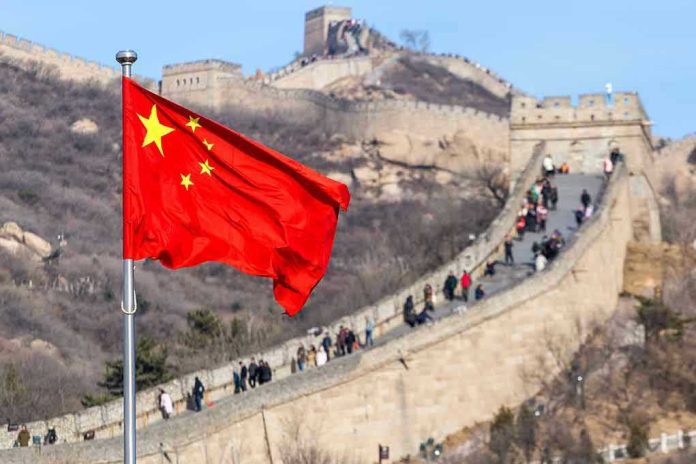
With the Dalai Lama’s 90th birthday drawing thousands of supporters to the hills of India, the world is left wondering if his bold rebuke of Communist China will spark a crisis in global religious freedom or simply expose the farce of Beijing’s claims over Tibetan Buddhism’s most sacred traditions.
At a Glance
- Dalai Lama celebrates 90th birthday in exile, vowing his reincarnation will defy Chinese control
- China’s government insists it alone will pick the next Dalai Lama, escalating tensions
- Global leaders and thousands of followers show support in Dharamshala, India, despite Beijing’s threats
- Succession dispute could fragment Tibetan Buddhism and set a precedent for state interference in religion
Dalai Lama’s 90th Birthday: Defiance on Display in Exile
Thousands gathered in Dharamshala, India, braving rain and state surveillance, to honor the 90th birthday of the Dalai Lama—Tibet’s exiled spiritual leader and one of the last unbowed symbols of faith and freedom in an era where authoritarian regimes are all too eager to trample tradition. From the stage, the Dalai Lama declared that his reincarnation would happen outside of Chinese control, directly challenging Beijing’s brazen claim that only the Communist Party—yes, the same government that bulldozes churches and jails pastors—should pick the next spiritual head of Tibetan Buddhism. This isn’t just a birthday bash. It’s a showdown over religious freedom, national identity, and the right of a people to choose their own leaders, not have them dictated by party apparatchiks in matching gray suits.
The scene was a stark reminder of how exiles and the faithful have resisted the slow suffocation of their culture since 1959, when the Dalai Lama fled his homeland after Communist troops crushed Tibetan self-rule. The Indian government, walking its usual diplomatic tightrope, hosted the festivities but kept a cautious eye on relations with China, which labels the Dalai Lama a “splittist.” For the hundreds of thousands who tuned in worldwide—among them US, Taiwanese, and European dignitaries—this was a global rallying cry for religious liberty and a thumb in the eye of state overreach. If only America’s own politicians showed half as much spine when it comes to protecting basic freedoms at home.
Beijing’s Power Grab: Communist Party vs. Ancient Faith
Beijing’s position is as predictable as it is absurd: the atheist Chinese Communist Party claims it, and it alone, will identify and approve the Dalai Lama’s successor. This is the same regime that rewrites Bibles, crushes church congregations, and jails bishops—but now wants to play reincarnation referee for Tibetan Buddhism. The Dalai Lama’s insistence that his successor be born in a “free world” directly rebukes this power grab, setting up a collision course that could fracture Tibetan Buddhism and render the succession a global standoff.
China has precedent for this kind of meddling. In 1995, after the Dalai Lama recognized a young boy as the Panchen Lama, Chinese authorities abducted the child and installed their own puppet. The result: two rival Panchen Lamas—one revered by believers, the other a walking, talking state PR campaign. Now, Beijing wants to repeat the trick with the next Dalai Lama, betting that the world will look away. If this fiasco unfolds, it’s not just a religious dispute; it’s a warning shot for every faith community threatened by state interference from tyrants who think the state is God.
Global Reverberations: A Test for Religious Freedom Everywhere
The Dalai Lama’s birthday wasn’t just a sentimental event; it was a direct challenge to the world’s willingness to defend religious liberty against state overreach. Leaders from the US, Taiwan, and even Hollywood sent messages of support, while Beijing predictably fumed. The Central Tibetan Administration declared the coming year the “Year of Compassion”—a gentle rebuke to the thuggery of Communist control. But make no mistake: the stakes are enormous. If China installs its own Dalai Lama and the world shrugs, it will set a dangerous precedent for government interference in every major faith tradition, from Christianity to Islam to Judaism. The message? Your beliefs are only as free as your government allows.
For Tibetans in exile and those still suffering under Beijing’s boot, the succession fight will decide more than who wears the maroon robes. It’s about whether ancient traditions can survive in the face of ruthless modern bureaucracy, and whether the world will defend the rights of believers—or let them be steamrolled by state power. The Dalai Lama himself says he hopes to live to 130. For the sake of religious freedom everywhere, let’s hope his courage and clarity outlast the ambitions of those who would turn faith into just another branch of the government.
Sources:
Central Tibetan Administration













